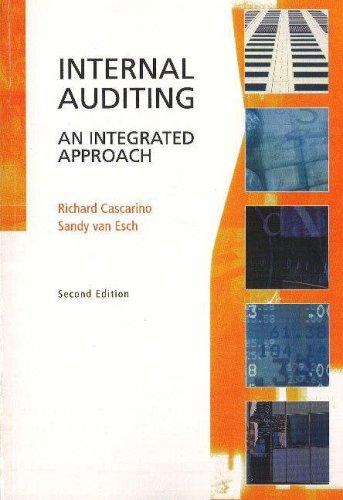Question
My answers are in bold. In the course of routine checking of all journal entries prior to preparing year-end reports, Betty Eller discovered several strange
My answers are in bold. In the course of routine checking of all journal entries prior to preparing year-end reports, Betty Eller discovered several strange entries. She recalled that the president's son Joe had come in to help out during an especially busy time and that he had recorded some journal entries. She was relieved that there were only a few of his entries, and even more relieved that he had included rather lengthy explanations. The entries Joe made were: (1)Work in Process Inventory 25,000 Cash25,000(This is for materials put into process. I don't find the record that we paid for these, so I'm crediting Cash because I know we'll have to pay for them sooner or later.) (2)Manufacturing Overhead 12,000 Cash12,000(This is for bonuses paid to salespeople. I know they're part of overhead, and I can't find an account called "Non-Factory Overhead" or "Other Overhead" so I'm putting it in Manufacturing Overhead. I have the check stubs, so I know we paid these.) (3)Wages Expense 120,000 Cash120,000(This is for the factory workers' wages. I have a note that employer payroll taxes are $18,000. I still think that's part of wages expense and that we'll have to pay it all in cash sooner or later, so I credited Cash for the wages and the taxes.) (4)Work in Process Inventory 3,000 Raw Materials Inventory3,000(This is for the glue used in the factory. I know we used this to make the products, even though we didn't use very much on any one of the products. I got it out of inventory, so I credited an inventory account.) Here are my responses: If the entry (1) was not corrected, which financial statements (income statement or balance sheet) would be affected? What balances would be overstated or understated? The balance sheet would have been affected because cash was credited instead of raw materials. Cash is reported on the balance sheet so if the journal entry had not been corrected then the balance of cash on the balance sheet would have been understated If the entry (2) was not corrected, which financial statements (income statement or balance sheet) would be affected? What balances would be overstated or understated? Since the payment made was for sales people the same shall be reported under the head Selling expenses(sub heading Salaries& wages.) If this was not corrected this adjustment would have not overall effected the income statement, but it would have an internal effect on the income statement. The increased manufacturing overhead would have increased product cost, at the same time the understated salaries would have resulted in understated selling expenses. Now if we look towards balance sheet this would have left a effect on value of closing inventory(because inventories are recorded on cost/market price whichever is lower). Had this adjustment not been corrected the cost price of inventories might have shoot up(because manufacturing overhead is added to cost of inventories). Since the closing inventory is reported on balance sheet this would have affected balance sheet. If the entry (3) was not corrected, which financial statements (income statement or balance sheet) would be affected? What balances would be overstated or understated? To the income statement it won't have any overall effect. It will just be the error of posting. If not corrected the wages might have shown as 18000 more and employee payroll tax as 18000 less. To the balance sheet it would have effected both the asset and the liabilities side. To the asset side the cash would have shown as 18000 less since Joe assumed 18000 would be paid in cash, which might not happen, to the liabilities side there would be an outstanding employee payroll tax account of 18000. If the entry (4) was not corrected, which financial statements (income statement or balance sheet) would be affected? What balances would be overstated or understated? The incorrect posting of raw material of 3000 would increase the production cost, hence reducing the overall Income. At the same time it would have reduced the balance sheet asset side by showing less of WIP. Here is what my prof is telling me, how to do I get this correct, help. First, your answers are not very clear as to exactly which accounts on which statements are affected and how. I recommend re-organizing how you present your answers. For example, state the Cost of Goods Sold account on the Income Statement is understated and the Inventory account on the Balance Sheet is overstated. More precise and clear. Second, you still mention overhead as being incorrect on the financial statements even though I have stated multiple times that product costs (materials, labor, overhead) are not separately reported on the financial statements. They are accumulated in the Inventory account on the Balance Sheet until sold then expensed as Cost of Goods Sold on the Income Statement. Third, selling expenses are not related to any of the journal entries.
Step by Step Solution
There are 3 Steps involved in it
Step: 1

Get Instant Access to Expert-Tailored Solutions
See step-by-step solutions with expert insights and AI powered tools for academic success
Step: 2

Step: 3

Ace Your Homework with AI
Get the answers you need in no time with our AI-driven, step-by-step assistance
Get Started


